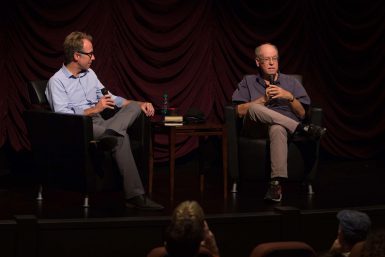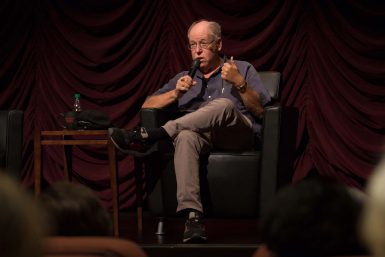Rubin describes spirituality’s impact on his filmmaking

The stories Academy Award-winning screenwriter Bruce Joel Rubin tells deal with life, death and beyond. The connectedness between life stages is a common theme in his movies that often mirrors his personal spiritual journey — one that helped him find his own voice in filmmaking.
“I loved the ride, but I don’t dwell on it, and it does not define me,” said Rubin, MS’80, of his time in Hollywood. “What really has been the core of my life is trying to find out who I am and what I need to say to the world I’m in.”
The lecture, “Finding Your Voice,” was the first of The Media School’s fall Speaker Series. It was in conjunction with the IU Cinema’s Jorgensen Guest Filmmaker Series on Monday afternoon in the Cinema. Rubin is best known for writing scripts for films including Ghost, Jacob’s Ladder, Deep Impact, My Life, Stuart Little 2, The Last Mimzy and The Time Traveler’s Wife. His Oscar was for Best Original Screenplay for Ghost.
“The films look backward while also looking forward,” said IU Cinema Director Jon Vickers. “His films deal with the spiritual side of human experience.
As a child, Rubin said he had feelings and intuitions that set him apart from his peers. He recounted several experiences that had a profound effect on him personally or professionally, such as being hugged closely by his grandmother before she died, and witnessing the aftermath of an accident that killed a girl his age.
“I was not like everybody else,” he said. “I had feelings and emotions related to inevitabilities that other people do not share.”
Rubin knew he wanted to do something with film or theater from 4 years old. The first movie he saw was The Jolson Story, a 1946 biography of singer Al Jolson that he said “spoke from the heavens.” He refused to leave the theater after it ended, so his parents watched it again with him. He also grew up helping his amateur actress mother with her lines, always directing her to do better. The first play he saw was Mary Poppins. His mother played Mrs. Banks.
“That was my introduction to theater. It was like another world in front of me, and yet it was this world, and they somehow all merged together,” Rubin said. “So I knew at an early age that I was going to be in something to do with theater and film, and then I had to figure out how I could get there.”
However, as an undergraduate in New York University’s film program, where his contemporaries included directors Brian De Palma and Martin Scorsese, he struggled to come up with stories when given the opportunity to make his first films. It wasn’t until he discovered a more spiritual sense of being that he realized he had stories he was supposed to tell the world. He read books including Bhagavad Gita and the The Tibetan Book of the Dead that inspired him to travel to India and find spiritual guidance.
Through his practice, he was pushed to begin writing and looking for a voice in his stories. When he felt called to go to Bloomington to join a spiritual community there, he left his job as a film curator for the Whitney Museum of American Art and moved his family to Indiana.

“You have to be able to jump from one thing to the next without having a road. You have to be willing to take the risks that life offers you if you want a life,” Rubin said. “The universe said to me, ‘Tell people what you saw,’ and they offered me a path. They didn’t tell me, ‘This path isn’t paved; you have to do these things to earn it.’”
During his time in Bloomington, Rubin earned a master’s degree in audio-visual communication from the School of Education, and his wife, Blanche, received a doctorate in art education. He continued to write scripts, on two occasions locking himself for several days in a room at the Poplars Building when it was still a hotel until he had completed a script.
“The six years we spent here were joyful beyond measure,” he said.
From Bloomington, the family went on to DeKalb, Illinois, where Blanche became a faculty member at Northern Illinois University. Rubin had no interest in Hollywood, but eventually, at De Palma’s and Blanche’s urging, he agreed to move to Los Angeles. From there, his career took off.
“We took a leap of faith,” he said of the move. “Leaps of faith and extraordinary effort are two of the great secrets of life.”
Rubin’s trust in the universe’s guidance kept his ego at bay, despite constant ‘no’s’ from producers.
“Here’s what’s great about Hollywood: It’s an ego crusher. BOOM. Like that. It crushes you every opportunity that it has,” Rubin said. “If you allow this process to happen, you get your freedom back.”
Rubin let the no’s he heard fuel his creativity. The producers who pushed him created better films with him.
Terry Sloan is a longtime patron of the IU Cinema. His love of movies led him to Rubin’s lecture.
“It’s so hard to achieve that effortlessness,” Sloan said. “I’m so interested in him living two lives — one of spirituality and one of physicality.”
Rubin continues to study and teach Eastern practices as he has for five decades. On one last trip to India, he thanked the places that helped him find his voice in film and realized he was done with the medium. He now is exploring photography as a creative outlet.
“We’re all looking for the aesthetic moment,” Rubin ended. “Every one of us is looking for that thing that says ‘done.’”
More:

